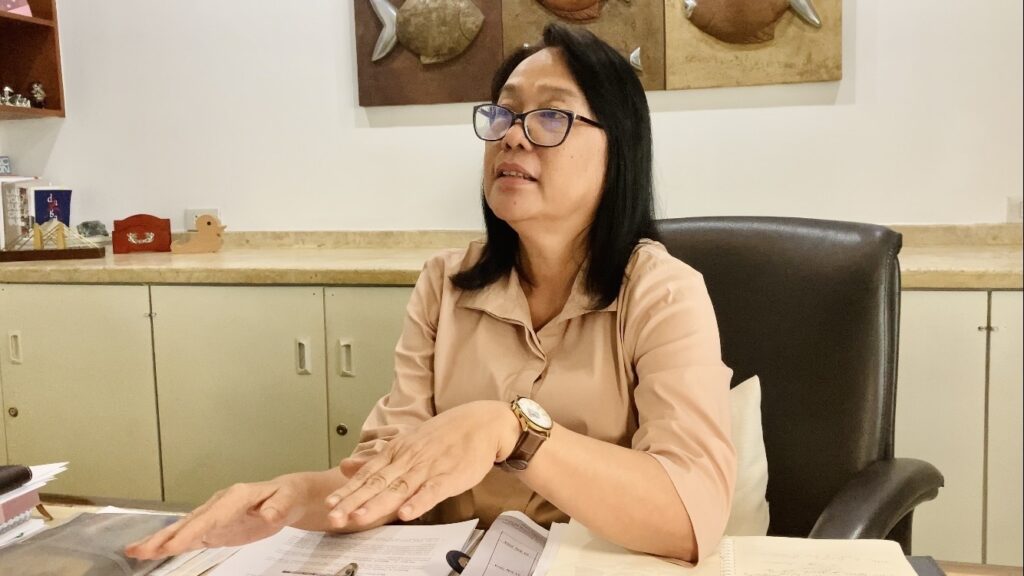DTI-7 to focus on monitoring price cap on rice

Joy Suralta, chief of DTI-7 Consumer Protection Division, assured that rice retailers do not have to worry about getting penalized if they fail to comply with the new price cap on rice. | CDN File Photo by Niña Mae Oliverio
CEBU CITY, Philippines — An official from the Department of Trade and Industry in Central Visayas (DTI-7) has reiterated their focus on monitoring the price ceilings mandated by the president.
The implementation of the Executive Order (EO) 39 of President Ferdinand “Bongbong” Marcos Jr. started on Tuesday, September 5.
Under the EO, dated August 31, regular milled rice is capped at P41 per kilo while well-milled rice is at P45 per kilo.
Joy Suralta, chief of DTI-7 Consumer Protection Division, assured that rice retailers do not have to worry about getting penalized if they fail to comply with the new price cap on rice.
Suralta admitted that the EO also affects the rice retailers.
Rice price caps monitoring
Moreover, she said that as of now they are mainly focusing on monitoring the price caps, especially the situations in the wet markets and supermarkets.
She said that DTI-7 and some personnel from the Department of Agriculture (DA) have settled on Monday, September 4, that DA would monitor the wet markets. The DTI, on the other hand, will monitor prices in supermarkets.
She added that the EO is a temporary measure taken by the government to curtail the prices of rice.
She said that based on the data given to them, there is sufficient supply of rice. The only problem is the rice prices.
She said that through the EO, rice prices will be controlled, noting that the National Food Authority can no longer intervene in the markets because of the Rice Tariffication Law.
READ: NFA-7 assures sufficiency of rice stocks in Central Visayas
Profiling
Besides price monitoring, DTI is also focusing on profiling the affected retailers.
And while they do the price monitoring, they also ask help for the personnel from other divisions of DTI because of the lack of manpower.
They prioritize profiling big markets first and coordinate with the market administrators to identify the rice retailers.
They would want to know the purchase price of the rice retailers first.
“Tungod sa kakalit sa EO, ang retailers, basig naay nakapalit nila nga mas mahal,” she said.
Through the profiling, they would be able to know the amount of loss on the retailer’s end so they could provide cash assistance.
No penalty
She clarified that they are solely focusing on monitoring and not on penalizing.
This means that they will not penalize rice retailers who would not follow the price cap.
She added that they understand the reactions of the retailers because they are still in the progress of profiling.
“Mao nang paspasan gyud ang profiling kay tan-awon man namo unsa juy kadak-on ang losses nila,” she said.
Impact on retailers
In a report from Inquirer, Erwin Gok-ong, a rice retailer for over 40 years in Cebu City acknowledged that the price cap would benefit consumers.
However, he is worried that some retailers might go out of business.
Arlene Agas, a rice retailer for over 10 years in Minglanilla town in Cebu also shared the same sentiments on the immediate implementation of the EO. With reports from the Inquirer
/bmjo
ALSO READ:
Rice retailers groaning under new price caps
Bongbong Marcos orders price caps for rice at P41 to P45 per kilo
Compliance with rice price ceiling still low
Disclaimer: The comments uploaded on this site do not necessarily represent or reflect the views of management and owner of Cebudailynews. We reserve the right to exclude comments that we deem to be inconsistent with our editorial standards.
